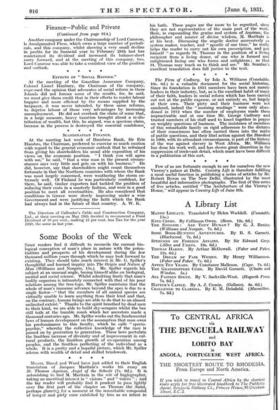Some Books of the Week
SOME readers find it difficult to reconcile the current bio- logical conception of man's place in nature with the poten- tialities and prospects of his development during the few thousand million years through which he may look forward to existing. They should take much interest in Mr. G. Spiller's thoughtful and learned inquiry into The Origin and Nature of Man (Williams and Norgate, 15s.). Mr. Spiller regards his subject at an unusual angle, basing himself alike on biological, mental and social science. Whilst admitting freely that man's bodily organism is intimately connected with that of his poor relations among the tree-tops, Mr. Spiller maintains that the whole of man's immense advance beyond the apes is due to a single factor—" that the members of all animal species are virtually unable to learn anything from their kind and that, on the contrary, human beings are able to do that to an almost unlimited extent." Thanks to the spirit breathed by dead men to their kind, we are able to build sky-scrapers whilst the bee still toils at the humble comb which her ancestors made a thousand centuries ago. Mr. Spiller works out the fundamental laws of human development on the assumption that man owes his predominance to this faculty, which he calls " specio- psychic," whereby the collective knowledge of the race is passed on by generation to generation. These laws postulate the limitless increase of diversity and of improvement in cul- tural products, the limitless growth of co-operation among peoples, and the limitless perfecting of the individual as a whole. It is a pretty and a hopeful picture, which Mr. Spiller adorns with wealth of detail and skilled brushwork.
* * * *






































 Previous page
Previous page